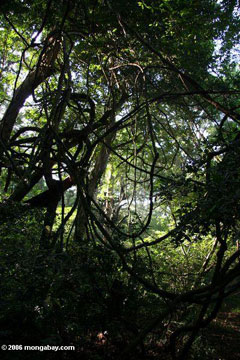Contentious Uganda rainforest reserve safe, for now
Uganda rainforest reserve safe, for now
mongabay.com
May 23, 2007
Uganda’s cabinet has suspended a proposal to allow a sugarcane grower to convert part of Mabria rainforest reserve for a plantation, reports Reuters. The plan, a pet project of president Yoweri Museveni, faced widespread opposition that was capped by deadly riots.
Reuters quotes Ugandan Environment minister Maria Mutagamba as saying the government had shelved the project pending a cabinet committee review.
“There is a suspension until the committee reports back,” Mutagamba told Reuters. “It is an extensive process — it is not going to be finished in a week or a month.”
Last month three people were killed in a protest against the plan. While president Museveni claimed the plantation would create jobs, critics said the plan would destroy a rare rainforest habitat for endemic species, while threatening rainfall and soil erosion. critics also argued that the destruction of the reserve, which was established in 1932, would hurt Uganda’s burgeoning tourism industry. There were also claims that government members stood to benefit financially through the deal through the illegal sales of logged timber.
 Rainforest in Uganda. Photo by Rhett A. Butler. More Uganda photos. |
Scientists say Mabira is home to at least 312 species of tree, 287 species of bird and 199 species of butterfly, including several endemic species. In February, a well-respected primatologist said that local population of the gray-cheeked mangabey (Lophocebus albigena) was a unique species that would soon be designated as the Ugandan gray-cheeked mangabey (Lophocebus ugandae). He said that the threat to Mabira forest would put the species at greater risk.
“I presented the analyses in the International Primatological Society Congress in Entebbe last year,” said Dr. Colin Groves of the Australian National University. “I had not thought it a priority to publish it… but now the threat to Mabira Forest has emerged, and this makes it more urgent. Although L. ugandae is widespread in the western and lakeshore forests of Uganda, it is apparently very abundant in Mabira, and the loss of this population would probably mean the loss of about a quarter of the total population of what now turns out to be an endemic species.”